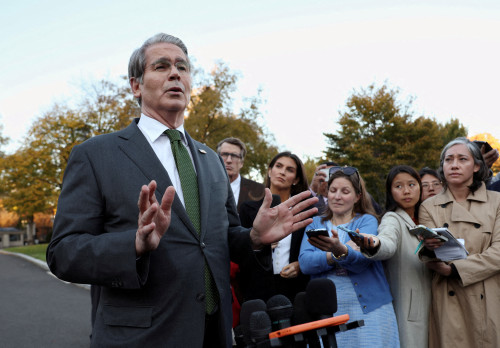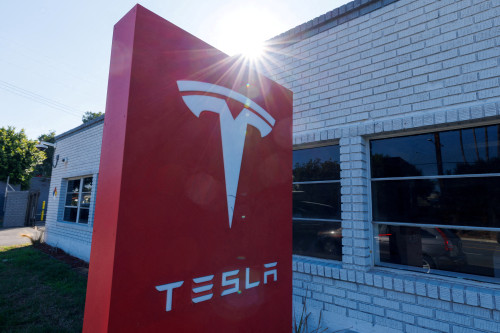By Andrea Shalal and David Lawder
WASHINGTON (Reuters) -Treasury Secretary Scott Bessent on Sunday said the 43-day government shutdown caused an $11 billion permanent hit to the U.S. economy, but he was optimistic about growth prospects next year given easing interest rates and tax cuts.
Bessent told NBC’s “Meet the Press” program that parts of the U.S. economy that are sensitive to interest rates, including housing, had been in recession, but he did not see the entire economy at risk of negative growth.
He blamed the services economy, not U.S. President Donald Trump’s sweeping tariffs, for inflation – repeating the Trump administration’s longstanding take – and added that he expected lower energy prices to drive down prices more broadly.
Trump has focused intensely on affordability in recent weeks after Democratic wins in state and local elections and his declining approval ratings – now at 38% – the lowest since his return to power, according to a recent Reuters/Ipsos poll.
Bessent struck an upbeat tone, despite recent data showing a slowdown in U.S. factory activity as higher prices caused by tariffs on imports restrained demand. The University of Michigan’s consumer survey released on Friday also showed frustration among consumers about higher prices.
“I am very, very optimistic on 2026. We have set the table for a very strong, non-inflationary growth economy,” Bessent said.
Energy prices dropped in October while home sales rose, Bessent said, adding that the administration was continuing to work hard to bring down inflation, now running at 3% annually.
The Treasury secretary said inflation was 0.5% higher in Democratic-controlled states than those run by Republicans, attributing the difference to increased regulation.
HASSETT SEES BLOCKBUSTER 2026
National Economic Council Director Kevin Hassett told Fox News’s “Sunday Morning Futures” that he expected 2026 to be “an absolute blockbuster year,” although there would be a “hiccup” in the fourth quarter of this year because of the longest government shutdown.
Expectations for the fourth quarter have been halved, he said, forecasting growth of 1.5% to 2%, with an expected rise in manufacturing jobs to boost the scenario for 2026.
Last week’s moves to cut tariffs on food imports like bananas and coffee were the result of trade deals that had been negotiated for months, Bessent said. “Inflation is a composite number and we look at everything, so we are trying to push down the things we can control,” he added.
Trump on Wednesday signed legislation ending the longest government shutdown in U.S. history, extending funding through January 30, and setting the stage for another potential showdown between Democrats and Trump’s Republicans next year.
Bessent said Republicans should immediately vote to end the filibuster if Democrats closed the government again, something Trump has also demanded, but dodged a question on whether there were enough votes to do so.
Policy changes that cap taxes on overtime, cut taxes on tips and Social Security for some individuals, and make auto loans deductible would boost real income levels for working Americans and help offset higher costs, Bessent said.
Taxpayers would see substantial federal tax refunds in the first quarter of 2026 given the changes in tax rates, he added.
The Trump administration also plans an announcement this week aimed at lowering healthcare costs, Bessent said, echoing similar remarks from a senior White House official last week, but giving no details.
A rash of trade deals would also help boost the economy, Bessent said, predicting new plant openings across the country.
(Reporting by Andrea Shalal and David Lawder; editing by Christina Fincher and Bill Berkrot)






